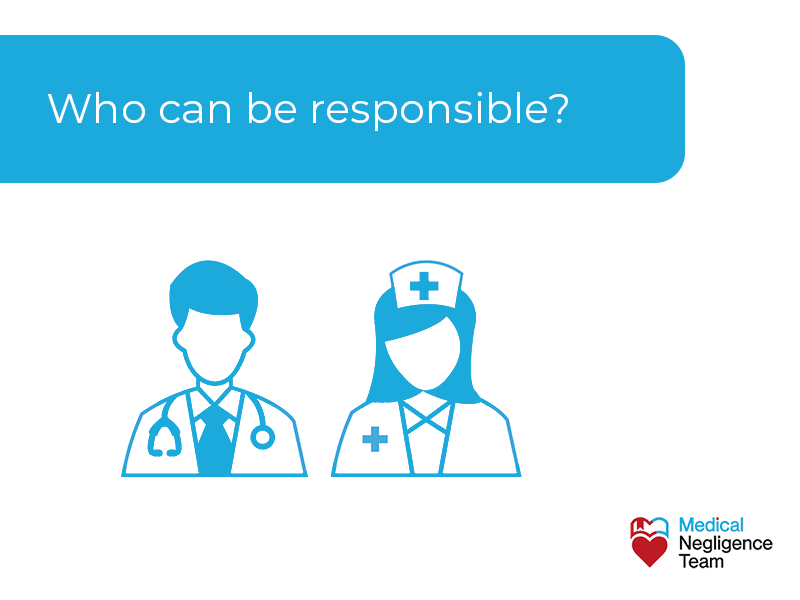Consent to medical treatment must be given by a patient before a medical professional begins any procedure. The doctor, nurse or hospital consultant must fully explain what they propose to do during the procedure before seeking consent from the patient.
Treating a patient without their consent is medical negligence. In some cases, it can be argued that treating without a person’s consent is what is known as battery and may result in severe permanent injury.
The healthcare professional responsible for the consent form is fully trained on how to obtain the consent and not to proceed without it.
If you or a loved one did not give consent to the medical treatment received, you may have a medical negligence case against the healthcare professional responsible or hospital.
A No Win No Fee medical negligence solicitor will take your case and fight for the compensation you deserve.

Table of content
What is medical consent?
Medical consent is the permission given by you, the patient, to undergo a medical procedure. It is good medical practice to explain fully what a procedure involves and of reasonable alternative treatments so that the patient can give a voluntary and informed decision on treatment.
It is not enough for a doctor or nurse to tell you that they are about to perform a medical procedure. They must get fully informed and voluntarily given consent to medical treatment first.
Any medical consent given by a patient must be given under the terms:

Voluntary medical consent
Voluntary consent is when the patient willingly gives permission for the procedure to take place. The patient must not be under any pressure from family or friends to consent to treatment.
The doctors and medical staff have a legal and ethical obligation not to coerce the patient to give consent, it must be a voluntary and informed decision, regardless of the procedure.
Informed medical consent
Informed consent is when all possible outcomes, side effects and potential negative effects of the medical procedure are explained to the patient. The patient must understand and accept what they are being told before the procedure can continue, even for emergency treatment.
It is not enough for medical professionals to say they are going to do an angioplasty and ask if that is ok with you, they must obtain consent to treatment from the patient.
They must explain how and why they are doing it, what the benefits are and what are the dangers of having the angioplasty.
Capacity to consent for medical treatment
Capacity in medical consent involves the patient being able to understand what any procedure involves. The patient can only give informed and voluntary consent when they have the capacity to understand what is happening. Parental responsibility for giving consent is also a factor.
If a patient is unable to give consent, such as someone with a severe mental health condition they may have a parent, a child’s legally appointed guardian or a person with power of attorney to make the decision.
Under the Mental Capacity Act healthcare professionals must obtain consent from the appointed person’s guardian before proceeding with the medical treatment.
Consent to medical treatment
Consent to treatment must be sought regardless of the procedure. It does not matter if it’s a brief oral examination or a detailed physical check-up, consent to treatment must be asked from and given by the patient.
In the case of surgery, details of the surgical procedure, the benefits and the potential complications must be explained to the patient.
It is medical negligence when the doctor does not seek consent to treatment from a patient before the treatment begins.
You may have a medical negligence compensation claim if the doctor does not seek medical consent before proceeding.
Types of consent to treatment claims
Types of consent to treatment claims range from the medical staff not obtaining consent to not explaining a procedure or going ahead with it, even after permission is refused.
Common types of consent to treatment claims are:

How to Sue the NHS
If you have been a victim of NHS negligence? If you have, you may sue the NHS for damages.
Not seeking consent to treatment claim
Not seeking consent to treatment should never happen. The medical professionals are fully trained and should seek consent to treatment, even for simple procedures like taking a blood sample.
The patient did not give consent claim
The patient did not give consent to the medical procedure performed on them, and the doctors carried it out regardless, is a very common medical consent claim. Consent forms should state exactly what is happening and how it will happen.
A patient may have ethical reasons for not wanting a particular treatment such as a blood transfusion or have life-saving surgery. A woman may not consent to a medical abortion for religious reasons, even if their life is in danger. A young person refuses treatment as they may prefer reasonable alternative treatments.
For the health professionals to not honour the decision to refuse consent is a serious form of medical negligence.
Risks not fully explained before the procedure
Risks not fully explained before the procedure is negligent behaviour under the informed aspect of consent to medical treatment. All sides of the procedure, including the benefits and risks and the choice to refuse treatment must be fully explained to the patient.
The patient cannot give a voluntary and fully informed consent to medical treatment if the risks are only partially explained.
Complications not explained that then happen during a procedure claim
Complications not explained that then happen during a procedure is when a potential risk occurs during the medical treatment. If the medical professionals did not inform the patient that the complication could happen, it is medical negligence. You could suffer a severe permanent injury due to the clinical negligence.
There is a risk of a blood clot forming during an angioplasty. If the risk is not explained when the patient was being informed of complications and they suffer a stroke during the surgery, it is medical negligence.
Consent is given but not for the actual procedure claim
Consent is given but not for the actual procedure is when a doctor carries out treatment while doing another one, the one that the patient gave written consent.
If the medical professional did not obtain consent for the medical treatment of the second procedure, it is medical negligence.
If a woman has complications during childbirth that involves surgery, it is usually to save the mother’s and the child’s life. The medical consent for the procedure is sought and given by the mother, usually by signing a consent form.
If the surgeon performs a hysterectomy during the surgery without consent, it is medical negligence.
The dangers of not having procedure not fully explained claim
The dangers of not having a procedure, not fully explained is another form of medical negligence under the informed consent process. The patient must be fully informed of every detail of the medical procedure, both good and bad when seeking consent to medical treatment.
For a patient to discover at a later date that they refused surgery though it would have been of benefit, is medical negligence.
Consent to medical treatment compensation claims come from the patient not being fully informed, not being able to give consent or consent not being given voluntarily
Who is responsible for lack of consent to medical treatment negligence?
A medical professional is responsible for lack of consent to medical treatment negligence. It is the job of every doctor, nurse, paramedic and hospital consultant to get the patient’s consent before performing a procedure.
There are exceptions, such as when there is an imminent danger to the life of the patient, but the medical staff must make every effort to request and receive consent before proceeding.
Gillick competence or a child who is Gillick competent can also play a part in a case of lack of consent.

It is the patient’s right to give consent on whether they want to have the medical treatment or would prefer not to have it. A medical professional’s ethical and legal obligation requires a patient to fully understand the clear medical reason for treatment.
To not seek consent to medical treatment or not respect the patient’s wishes is medical negligence, and you may have a medical negligence compensation claim.
How much can you claim for medical consent claims?
You can claim amounts from over £800 to more than £3,000 for minor effects such as a low-grade infection or a mild fever in a medical consent compensation case.
More severe complications such as mental trauma, long-lasting infections and other side effects when you did not give consent can lead to claims up to £18,000.
Other severe effects such as PTSD, medical complications and life-long conditions can give rise to awards of more than £50,000.
There is not one fixed amount awarded in consent to medical treatment negligence cases. As in all medical negligence claims, each case is dealt with on its merits and how much you have suffered due to consent to treatment negligence.
A No Win No Fee medical negligence solicitor will be the only one who can advise you on a person’s consent to medical treatment negligence claim. They will know from experience what your case may be worth and how to go about a successful claim
Your No Win No Fee medical negligence solicitor will handle your consent to medical treatment negligence claim and get you compensation for all damages incurred.
What can you claim for when suing for consent to medical treatment negligence?
You can claim compensation for any damages that occurred, when you did not give consent for medical treatment.
There are two types of compensation damages due when suing for any type of medical negligence: General damages and Special damages.

General damages
General damages are when you sue for the pain, suffering and the loss of amenity, PSLA, you have experienced due to negligence.
Special damages
Special damages include loss of earnings, future care costs, and out-of-pocket expenses.
Be sure to keep payslips, receipts and proof of any losses you experience as a result of the medical negligence.
You deserve compensation to cover all losses, including loss of life, medical costs and any long-term care needs.
When you or a loved one suffers from the effects of consent to medical treatment negligence, you make a claim for compensation.
Your No Win No Fee solicitor will guide you through the steps in making a consent to medical treatment negligence claim.
What are the steps involved in making a consent to medical treatment negligence claim?
The steps involved in making a consent to medical treatment negligence claim go from seeking medical advice to issuing court proceedings. The steps are a part of any successful compensation case, and settlement can happen at any stage in the process.
When you follow the steps correctly and get all the facts and figures together, your medical negligence solicitor will do the rest.

Step 1: Seek medical advice
Seek medical advice on the injuries you have suffered or are suffering with immediately you realise you experienced consent to medical treatment negligence.
Step 2: Contact a specialist medical negligence solicitor
Contact a specialist medical negligence solicitor who operates on a No Win No Fee basis and tell them what went wrong. The right solicitor will look at your case, see where the problem lies, and advise if you suffered consent to medical treatment negligence.
The Medical Negligence Team also have a 100% Compensation Guarantee scheme, where you get all the money awarded in a negligence claim.
You are the one who suffered medical negligence, and you should get all the money due for the suffering.
Step 3: Your medical negligence solicitor obtains your medical records
Your medical negligence solicitor obtains your medical records with your permission. By reading your records, they will confirm if they think you have a valid consent to medical treatment negligence case.
The medical negligence team will know from reading your medical records it the case will result in consent to medical treatment negligence compensation being paid.
Step 4: The medical negligence solicitor sending a letter of claim to the negligent party
The medical negligence solicitor sending a letter of claim to the negligent party is the next step. The letter will ask them to admit consent to medical treatment negligence in what is known as ‘sending a letter of claim.’
When the negligent party receives the letter of claim, it has up to four months to provide a written response.
Step 5: Getting a response from the negligent party’s insurer
Getting a response from the negligent party’s insurer will move your compensation claim closer to a conclusion.
The insurer will either admit the medical negligence or say they intend to defend the case. Deciding to defend the case is known as ‘deny liability’ in legal terms.
If they admit liability, your consent to medical treatment negligence claim can be valued.
The two parties will meet to decide on your consent to medical treatment negligence compensation payment.
Your solicitor will negotiate with the negligent party and use their experience to get the compensation you deserve.
Step 6: Issuing court proceedings
Issuing court proceedings is the next step if they deny liability in your consent to medical treatment negligence case. Going to court happens, too, when they are not prepared to pay a fair amount for the injuries you have suffered.
Your medical negligence solicitor issues the court proceedings.
Remember that less than 1% of medical negligence cases end up in court, and very few of those cases ever make it to the courtroom.
Our Process
Our team members have a higher career win rate with a 75% success rate on NHS letters of claim, compared to an industry average of 54.5%.
Enquiry
The first step is to get in touch and tell us what went wrong. It’s free and easy. Call our 24-hour helpline: 0800 246 1122 or request a callback here.
Medical Evaluation
Once you have spoken with our team we’ll let you know how we can help. Typically the next step is to obtain your medical records for us to review.
Legal Letter
Once all your medical records have been received they will be reviewed by a medically & legally qualified member of our team. If there is evidence of negligence we will send a letter of claim to the negligent party outlining your compensation claim.
Using a No Win No Fee solicitor
Using a No Win No Fee solicitor is the only way to a successful consent to medical treatment negligence claim. Your No Win No Fee medical negligence solicitor will not charge you for a claim you do not win.
Always have a fee agreement in place before engaging a medical negligence solicitor. If they start talking of a ‘win fee’ or a ‘success fee,’ you should walk away. The negligent party insurers should pay all fees.
The medical negligence solicitor should also operate a 100% Compensation Guarantee scheme. When you win the case, all the money awarded should go to you, not the solicitor.
You are the one who suffered consent to medical treatment negligence, and you deserve the compensation to get your life back to normal.

How long do I have to make a claim for consent to medical treatment negligence?
You have three years to make a claim for consent to medical treatment negligence. All medical negligence claims are subject to limitation periods.
For example, in England and Wales, medical negligence claims must generally be brought, court proceedings issued within three years of the injury, or three years of knowledge of the facts giving rise to the claim.
If someone has passed away, it is the date of death if the limitation period has not expired at the date of death.
Children not under a disability typically have until they reach 21 to start a consent to medical treatment negligence claim or court proceedings.
Persons under a disability, who lack capacity, are not subject to any limitation period.
Can I make a medical negligence claim against the NHS?
Yes, you can make a medical negligence claim against the NHS. Suing the NHS for negligence is not unusual. People sue the NHS for compensation for medical negligence and receive the money they deserve for the negligent treatment.
Each year there are between 8,000 and 10,000 successful medical negligence claims against the NHS. Suing the NHS for medical negligence can make some people feel uncomfortable.
Amounts in compensation claims awarded against the NHS range from £1000 to over £10 million. The amount you receive covers minor injuries such as scarring to serious life-threatening negligence, which leaves you with long-term care needs.
We trust in and use the NHS daily and do not expect negligence. It happens, though, and the NHS has a dedicated team to handle medical negligence compensation claims, called NHS resolution.
NHS Resolution has a responsibility to treat patients who seek compensation fairly. Patients pay for the
NHS through their taxes, and for that they deserve respect and the best medical treatment.
Contact The Medical Negligence Team
Contact the Medical Negligence Team today to discuss your consent to medical treatment negligence claim for compensation. We have both the legal and medical experts to guide you along the steps to a successful medical negligence claim for compensation.
At the Medical Negligence Team, we fight every compensation claim on a No Win No Fee basis. You will not be out of pocket for an unsuccessful claim.
We have a very high success rate and a reputation for a speedy and successful resolution to all medical negligence cases.

Our 100% Compensation Guarantee puts all the money you win into your pocket. You or your loved one suffered consent to medical treatment negligence, and you deserve every penny of the compensation.
Contact us at the Medical Negligence Team for all your medical negligence needs.

